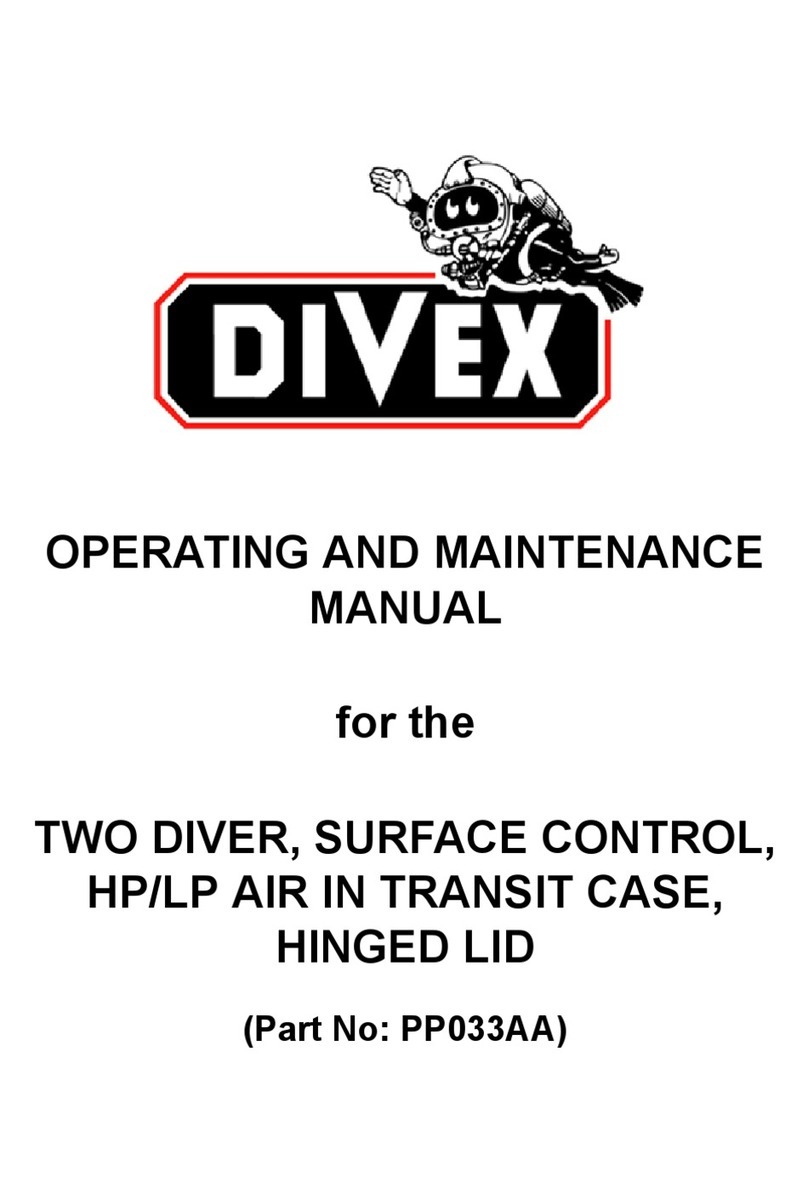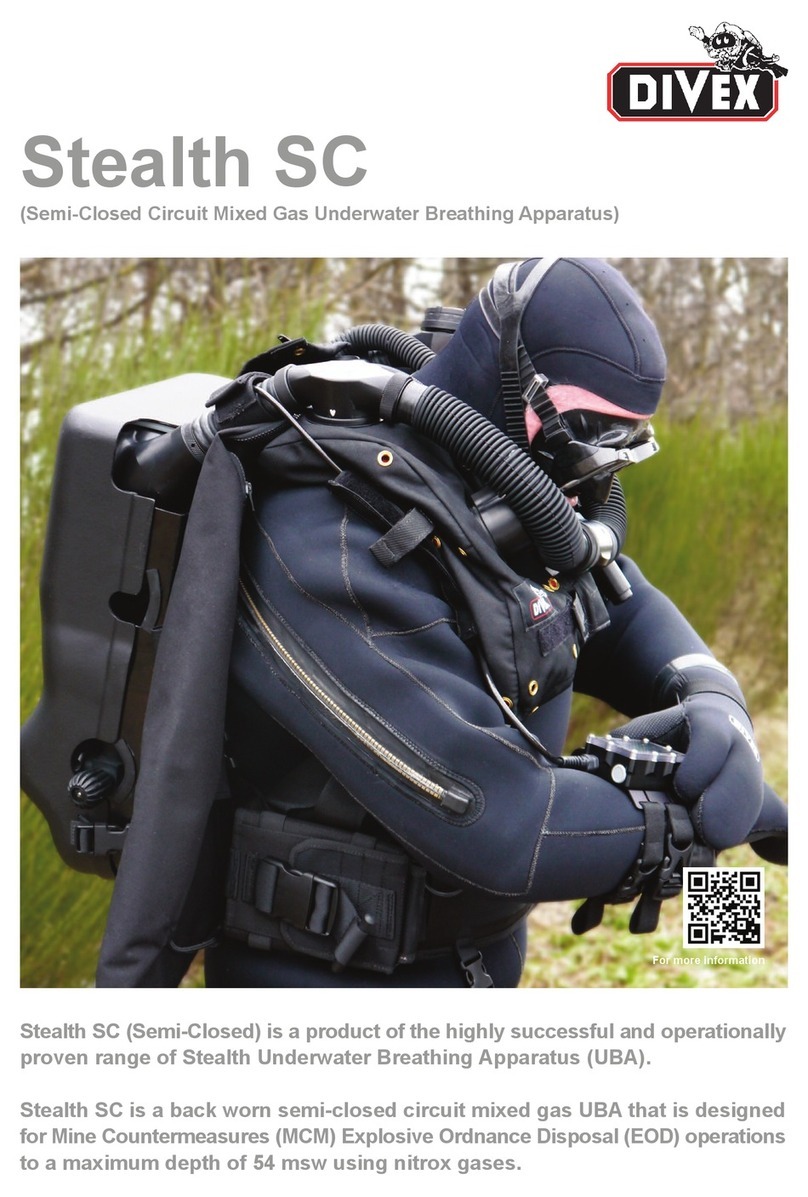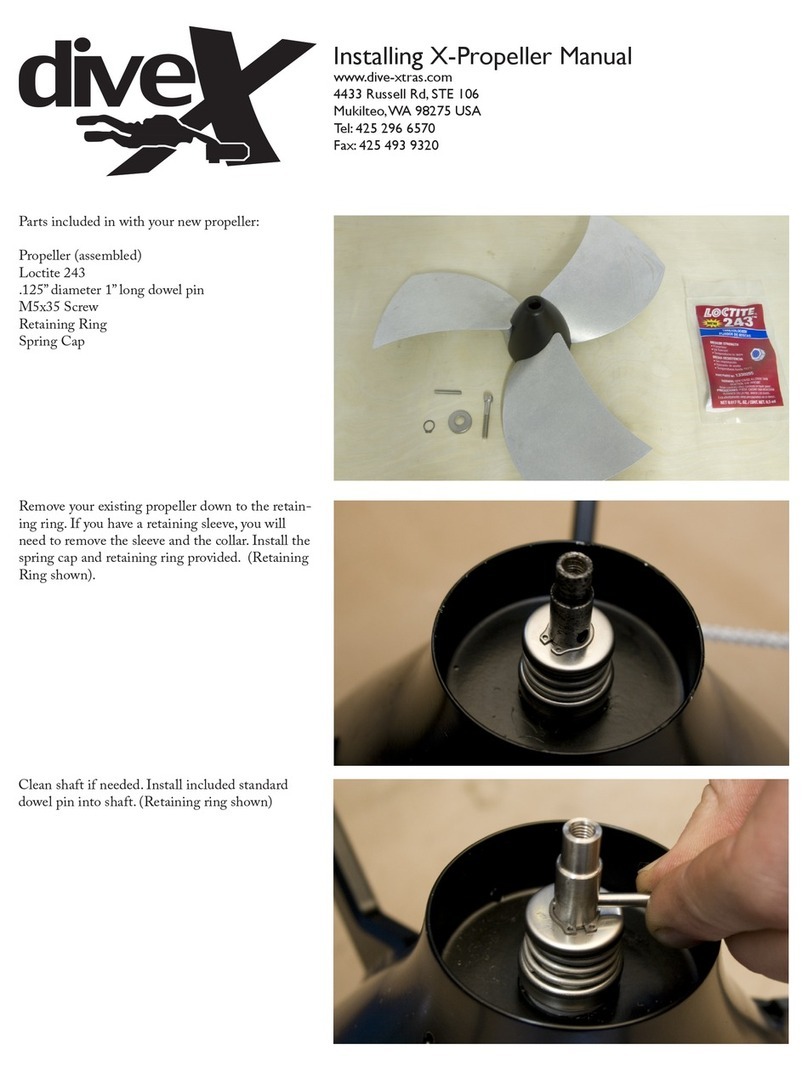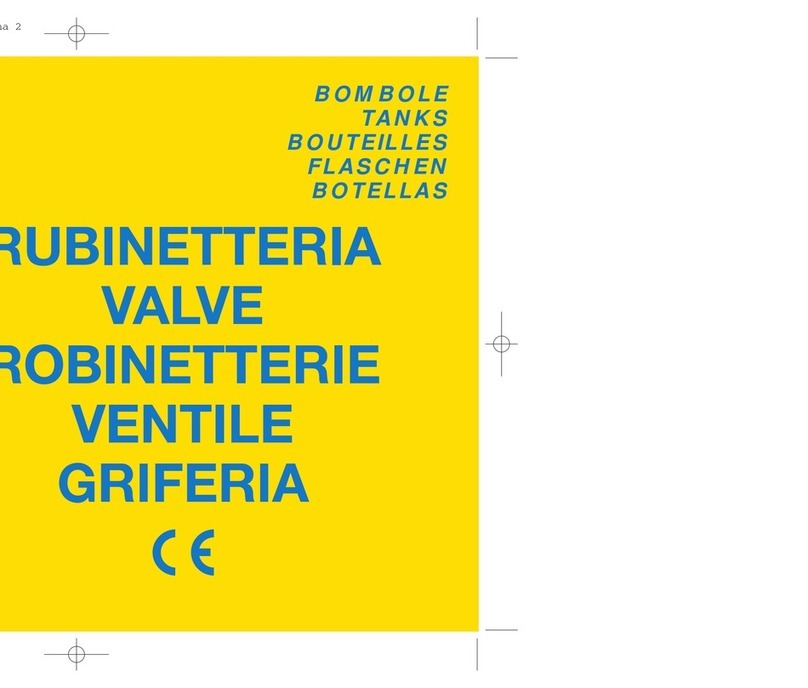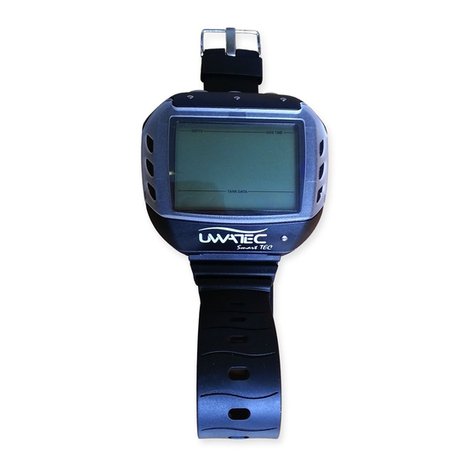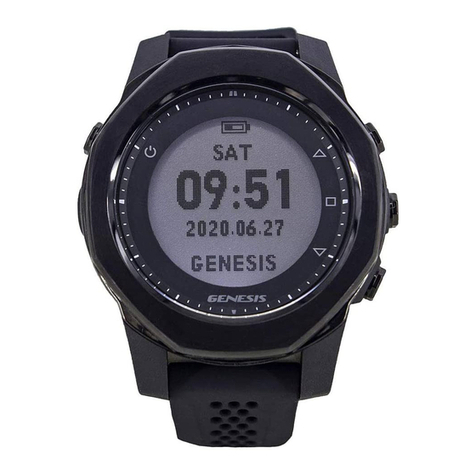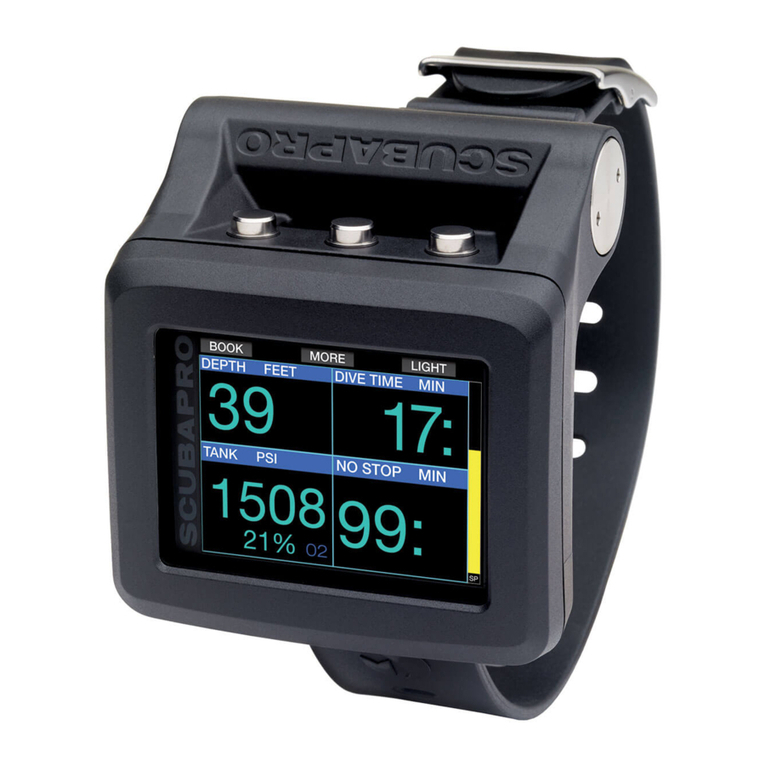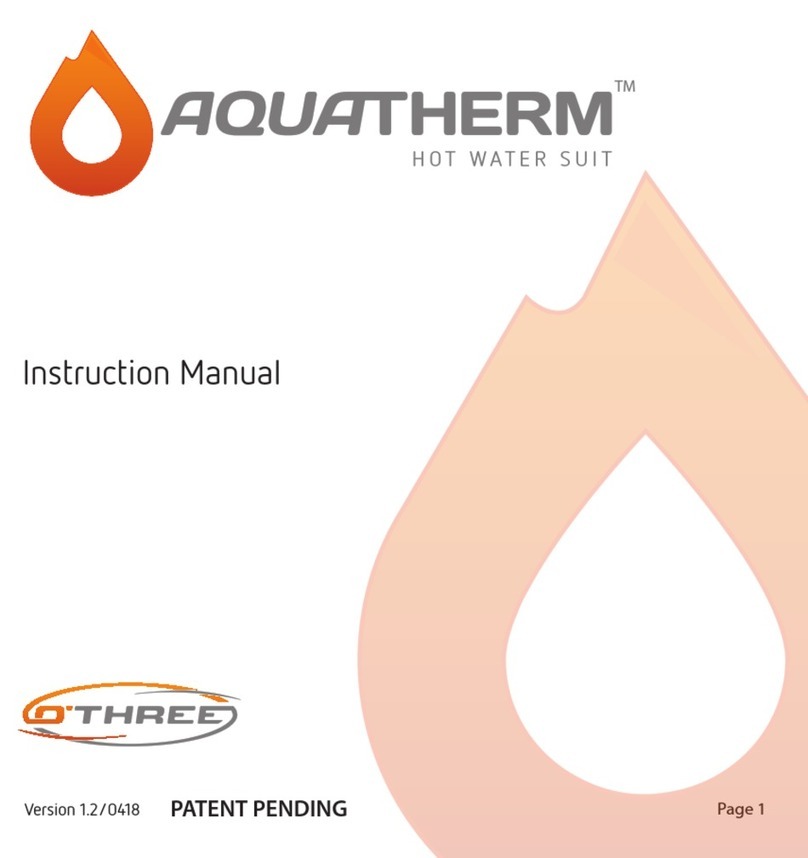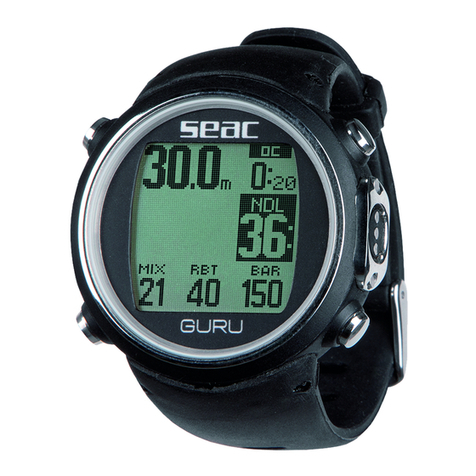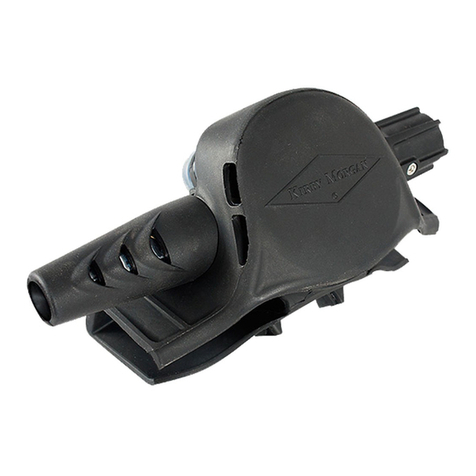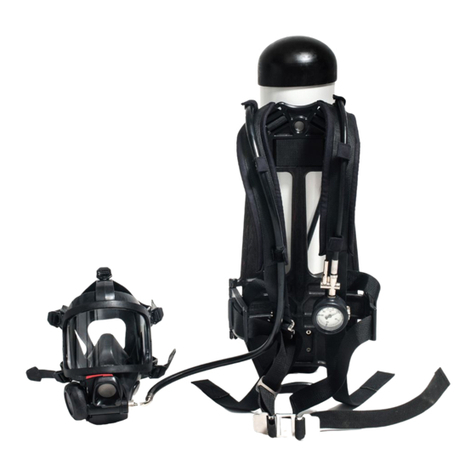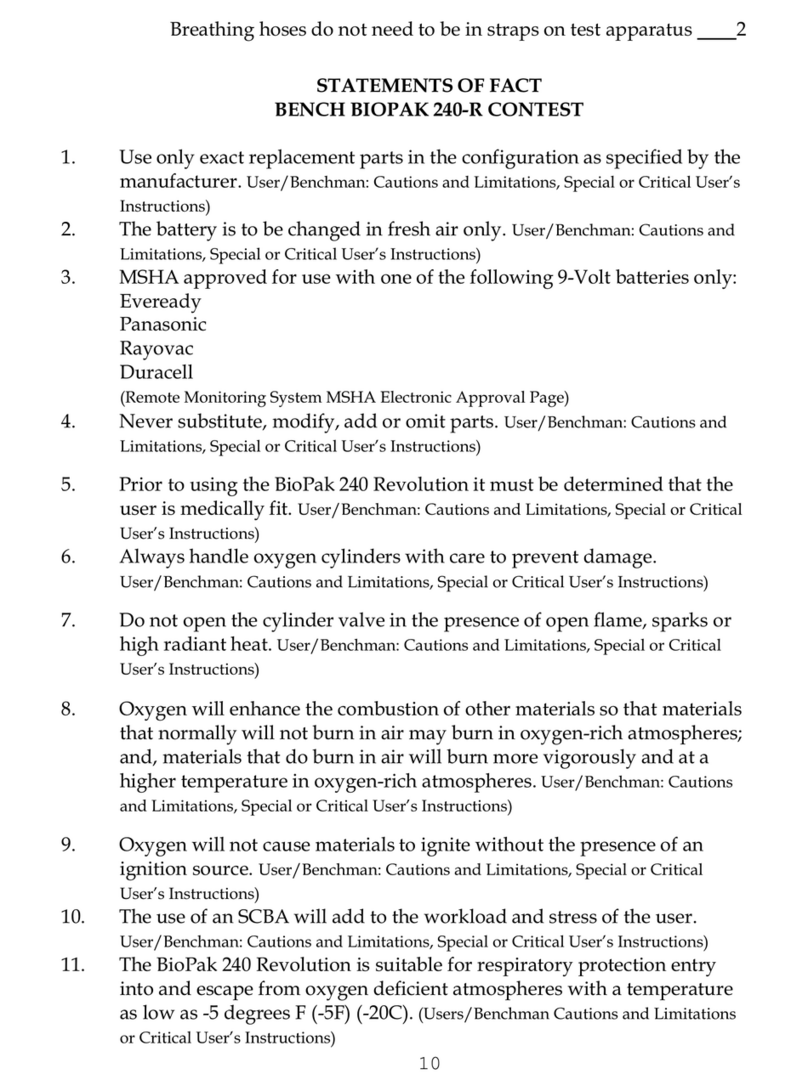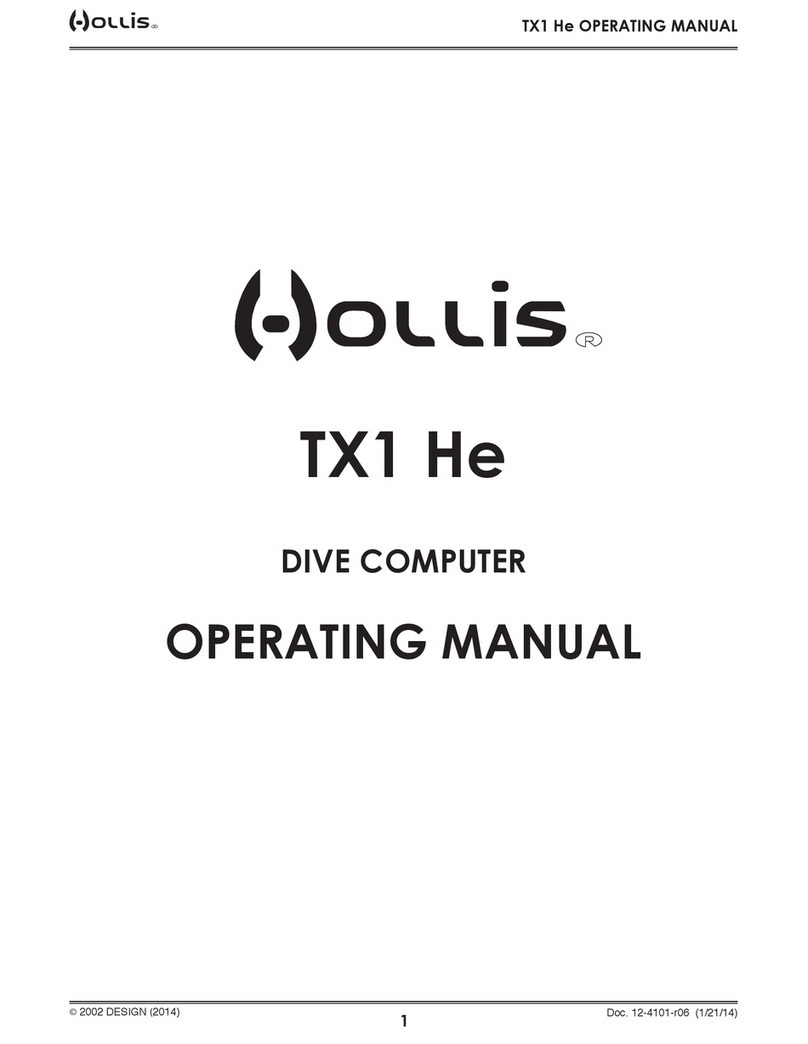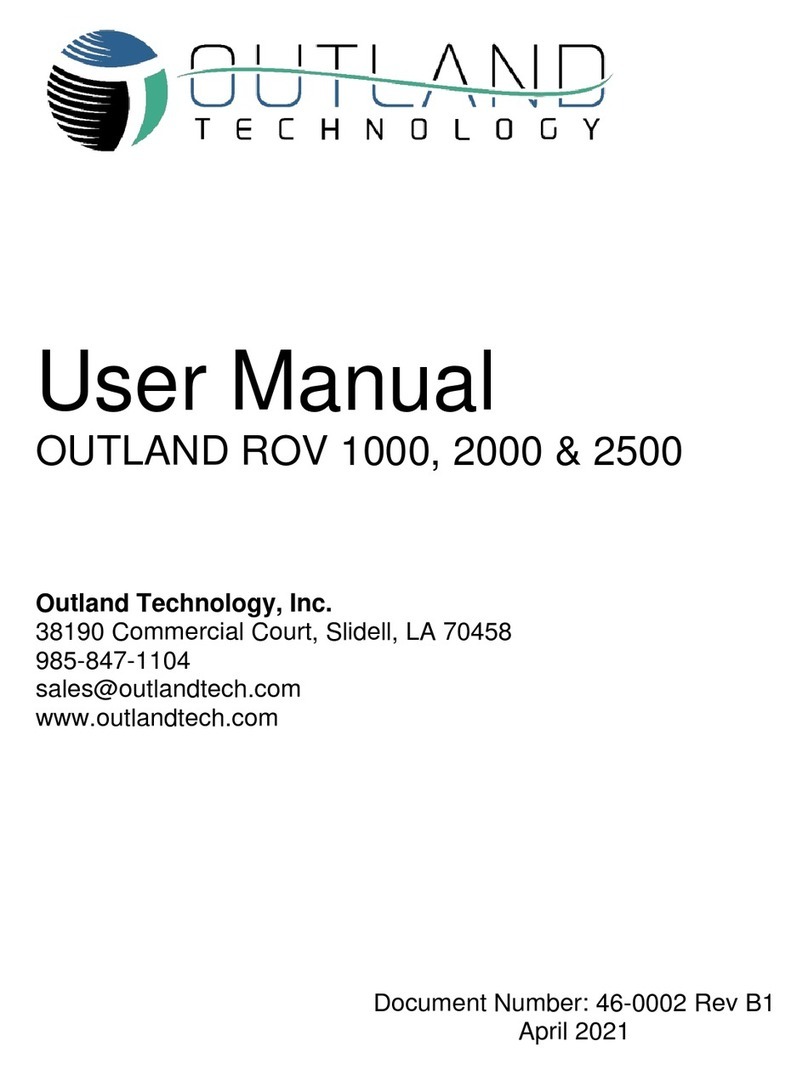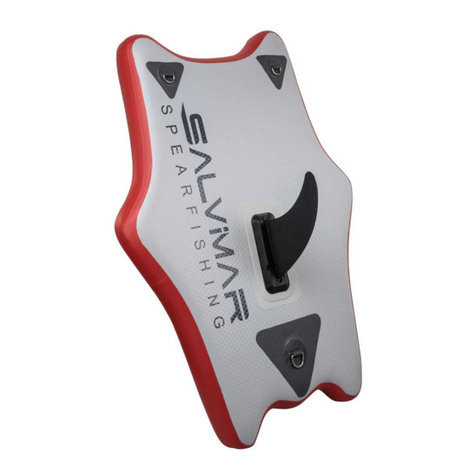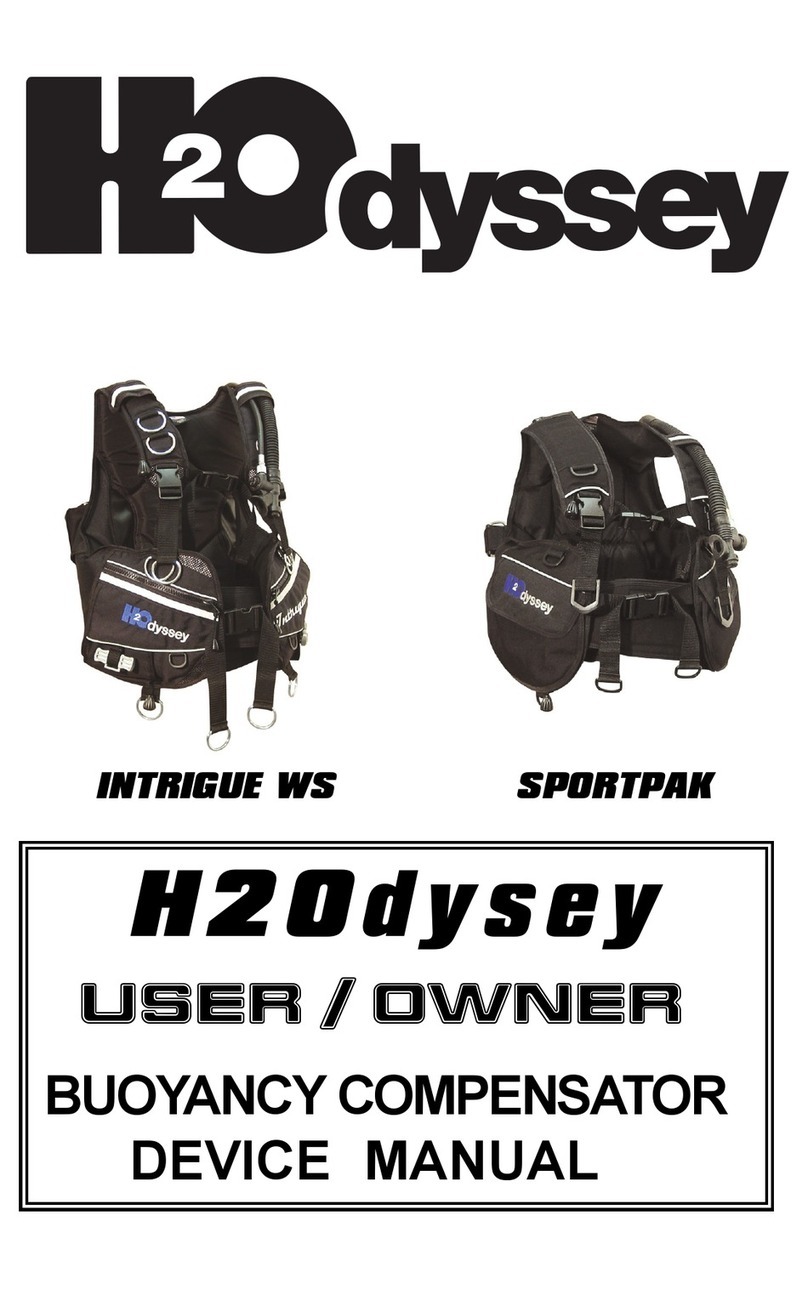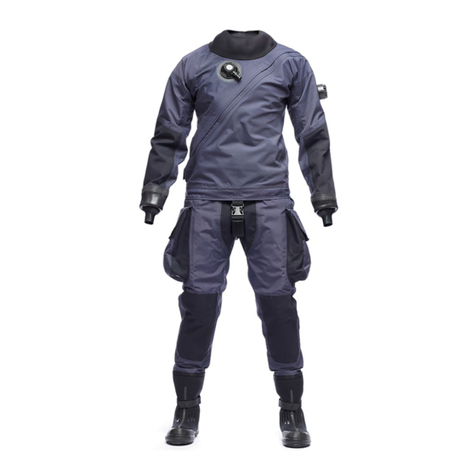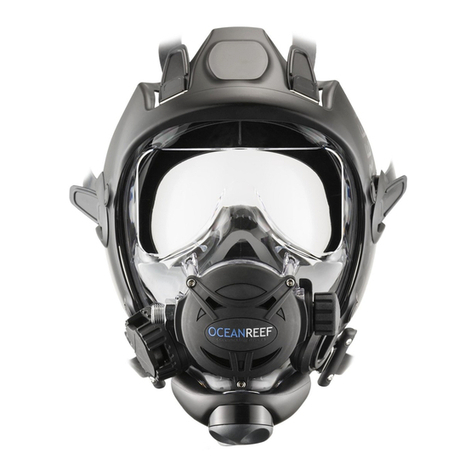DIVEX DIVEX ULTRALITE 2 E12380 Operating instructions

OM111
P1972-OM-367 Rev 6
OPERATING AND MAINTENANCE MANUAL
for the
DIVEX ULTRALITE 2
OVERBOARD DUMP DIVING CHAMBER BREATHING
MASK
Standard without communications - Part No: E12380
Standard with communications, HTU - Part No: E13841
Standard with communications, Banana Plug - Part No: E15000

(Intentionally Blank)

OM111 i
P1972-OM-367 Rev 6 Preface
PREFACE
The following address should be used in all communications with the manufacturer:
National Approvals and Markings:
1. Product Marking: 0088
Divex Limited declares that this Personal Protective Equipment is in conformity with the
provisions of Articles 10 and 11 of the EUROPEAN DIRECTIVE 89/686/EEC as a
CATEGORY 3 DEVICE, and is manufactured under a Quality System approved by
Lloyd’s Register Q.A. (Notified Body No. 0088).
2. National Approvals
The Divex Limited Quality Management System has been approved by Lloyd’s
Register Quality Assurance Limited to BS EN ISO 9001.
Approval Certificate No. 0850495.
Divex Ltd
Enterprise Drive, Westhill, Aberdeen, AB32 6TQ, United Kingdom
Telephone: +44 (0)1224 740145
Fax +44 (0)1224 740172
Email [email protected]
Web www.divexglobal.com
EC Type Approval conducted by: Germanischer Lloyd AG,
D-20459,
Hamburg,
Vorsetzen 32/35,
Germany
Notified Body No. 0098

ii OM111
Preface P1972-OM-367 Rev 6
(Intentionally Blank)

OM111 iii
P1972-OM-367 Rev 6 Approval Sheet
APPROVAL SHEET
DIVEX
MANUAL NUMBER: OM111
ADVITIUM NUMBER: P1972-OM-367
DOCUMENT TITLE: User Manual for the Ultralite 2 Overboard Dump Diving Chamber
Breathing Mask
REV DATE BY CHECK APP COMMENTS
0 01 November 1997 Hamish
Simpson Danny Gray Hamish
Simpson Original Issue
1 11 October 2000 PGB JR Ray Wylie ECN: 3302
2 18 July 2001 PGB Ray Wylie Ray Wylie ECN: 3493
3 19 June 2007 Christine Bain Jamie Massie Jamie Massie ECN: 9390
4 12 May 2010 Stewart Birnie Ray Wylie Ray Wylie ECN: 13504
5 20 May 2011 Debbie Allan Nick Graves Scott Waddell ECN: 14148
6 20 September 2012 Debbie Allan Alastair Naylor Mark Stevens ECN: 14955
7
ORIGINAL ISSUE DATE: 1 November 1997
ORIGINAL DOCUMENT BY: Hamish Simpson
CHECKED BY: Danny Gray
APPROVED BY: Hamish Simpson

iv OM111
Approval Sheet P1972-OM-367 Rev 6
(Intentionally Blank)

OM111 v
P1972-OM-367 Rev 6 Table of Contents
Page
PREFACE ........................................................................................................................................I
OPERATIONAL NOTICE ................................................................................................................1
CHAPTER 1 - WARNINGS ............................................................................................................3
CHAPTER 2 - INTRODUCTION .....................................................................................................5
CHAPTER 3 - OPERATION ...........................................................................................................7
CHAPTER 4 - CLEANING SOLUTIONS ........................................................................................9
CHAPTER 5 - FAULT FINDING ...................................................................................................11
CHAPTER 6 - PARTS LIST .........................................................................................................13
ANNEX A - BPR & RELIEF VALVE CONFIGURATIONS ............................................................19
ANNEX B - DRAWINGS & PARTS LISTS ....................................................................................21
TABLE OF CONTENTS

vi OM111
Table of Contents P1972-OM-367 Rev 6
(Intentionally Blank)

OM111 1
P1972-OM-367 Rev 6 Operational Notice
OPERATIONAL NOTICE
Only Divex approved spares shall be used on the Ultralite 2 in order to maintain CE PPE
approval of these products.

2OM111
Operational Notice P1972-OM-367 Rev 6
(Intentionally Blank)

OM111 3
P1972-OM-367 Rev 6 Chapter 1
CHAPTER 1 WARNINGS
The Divex Ultralite 2 is for use within a hyperbaric diving chamber and must NOT be used
underwater.
Pure oxygen and oxygen rich gases may be used to supply the mask. To reduce any risk of
combustion and / or explosion associated with the oxygen enriched environment, the mask
must be kept free from dust and dirt and free of any hydrocarbon greases, flammable
cleaning fluids, dust particles or other combustible materials.

4OM111
Chapter 1 P1972-OM-367 Rev 6
(Intentionally Blank)

OM111 5
P1972-OM-367 Rev 6 Chapter 2
CHAPTER 2 INTRODUCTION
The Divex Ultralite 2 mask is an anthropological oral/nasal based breathing system for use
by persons using a hyperbaric chamber. It is for use with breathable diving quality gases
such as pure oxygen, breathing quality oil free air and heliox (helium and oxygen) gas in a
hyperbaric diving chamber to depths down to 450 msw. The choice of gas to be breathed will
be dictated by diving table’s outwith the scope of this manual.
The following table shows which gases are technically acceptable for the mask at various
depths:
Heliox gas can be used at any working depth down to 450 msw, provided the partial pressure
of oxygen (PPO2) within the Heliox mixture, is within acceptable limits.
The mask has been designed to provide “overboard dump” i.e. exhausting the exhaled
breath to the outside of the chamber at atmospheric pressure and has been designed to
safely accept exhaust below chamber ambient pressure on its exhaust hose equivalent to –4
barg. It’s nominal design working suction, however, is –2 barg and hence at depths deeper
than 20 msw, the chamber system should be fitted with a back pressure regulator (BPR)
capable of maintaining the –2 barg suction at the required exhaled flowrate.
To prevent exhaust hose from collapsing when not in use, an inward relieving 3 barg relief
valve should be fitted between the exhaust hose and the BPR. Examples of setup
configurations are shown in ANNEX A (page 19).
The design supply pressure for the mask can range from 6 barg to 16 barg over the chamber
ambient pressure.
The Ultralite 2 mask has been designed to meet the Norwegian Petroleum Directorate’s
(NPD) work of breathing and respiratory pressures at all breathing rates to 62.5 litre/min
RMV from 3 msw to 450 msw. The mask can be used on the surface where it meets NPD
requirements up to 22.5 litre/min RMV and up to 40 litre/min RMV at 2 msw.
The Ultralite 2 mask can be supplied with or without diver communications.
The only difference between these variants is the communications cable assembly attached
to the supply hose. This manual details both variants.
This manual provides information for the user only, servicing and routine maintenance is
covered in detail in the “Service Manual for the Ultralite 2 Overboard Dump Diving Chamber
Breathing Mask” – document number OM079.
GAS DEPTH RANGE (MSW)
Oxygen 0-20
Breathing Quality Oil Free Air 0-50
Heliox 0-450

6OM111
Chapter 2 P1972-OM-367 Rev 6
(Intentionally Blank)

OM111 7
P1972-OM-367 Rev 6 Chapter 3
CHAPTER 3 OPERATION
Set the supply pressure to the following guidelines:
If a BPR is fitted, set the exhaust pressure to 2-4 bar suction, relative to chamber ambient
pressure.
When the Ultralite 2 mask is used it should be adjusted to the optimum breathing resistance
using the free flow control knob and set at the point where free flow on the inlet valve has just
stopped.
When the mask is initially donned, the head harness can be adjusted by pulling each strap
leg through the buckle for individual user comfort.
0-150 msw 6 - 12 bar Over chamber pressure
200 msw 8 - 12 bar Over chamber pressure
250 msw 10 - 12 bar Over chamber pressure
300 msw 11 - 12 bar Over chamber pressure
350 - 450 msw 12 bar Over chamber pressure

8OM111
Chapter 3 P1972-OM-367 Rev 6
(Intentionally Blank)

OM111 9
P1972-OM-367 Rev 6 Chapter 4
CHAPTER 4 CLEANING SOLUTIONS
4.1 Soapy Water
A solution of domestic soapy clean warm water will remove dirt and stains from the
mask and harness.
4.2 Disinfectants
TriGene II (concentrate supplied in multiples of 5 litres, Part No. SM039) is the only
disinfectant recommended by Divex for use with the Ultralite II BIBS mask.
4.3 Ultrasonic Cleaning
If, for any reason, hydrocarbon grease or metal filings have contaminated the mask,
the complete assembly and hoses should be striped down and cleaned in an
ultrasonic bath using an approved oxygen cleaning procedure.
4.4 Material Compatibility
Extensive tests by Divex have resulted in the recommendation in section 4.2
(page 9). It is wholly the responsibility of the user to verify compatibility with the
materials used within the construction of the mask. These materials are noted in
“Service Manual for the Ultralite 2 Overboard Dump Diving Chamber Breathing
Mask” – document number OM079 Chapter 10.
4.5 Cleaning Procedure
4.5.1 Remove Oral Nasal Assembly Part No: E15846.
4.5.2 Remove Head Harness Part No: E12366 from the buckles at each side of the mask
body.
4.5.3 Remove the Rear Panel Assembly Part No: E13837.
4.5.4 Remove Inlet and Exhaust Hoses from the mask banjos, Part No: E13160.
4.5.5 For disinfecting the parts, immerse the Mask Body Part No: E12364, the Oral Nasal
Part No: E15846 and the Rear Panel Part No: E13837 in a solution of 1 part Tri-
Gene II to 50 parts warm water for 15 minutes.
4.5.6 Rinse the parts in fresh water and allow to dry.

10 OM111
Chapter 4 P1972-OM-367 Rev 6
4.5.7 Connect Inlet and Exhaust hoses Part No: E13160 to the mask banjos.
4.5.8 Fit Oral Nasal Part No: E15846 and Rear Panel Assembly Part No: E13837.
4.5.9 Connect to gas supply and turn Freeflow Knob clockwise to blow any remaining
droplets of water from the inlet banjo before breathing the mask.

OM111 11
P1972-OM-367 Rev 6 Chapter 5
CHAPTER 5 FAULT FINDING
FAULT PROBABLE CAUSE REMEDY
5.1 Mask free flowing on inlet
side. Free flow control knob
screwed too far in. Back off free flow control
knob.
Inlet gas supply pressure
set too high. Reduce gas supply
pressure (6-12 bar over
chamber depth).
Inlet valve diaphragm
levers incorrectly set after
maintenance.
Reset diaphragm inlet
levers.
Damage to inlet valve
seat. Replace inlet valve stem
assembly.
Damage to inlet valve
nipple. Replace inlet valve nipple.
5.2 Mask continually sucking
chamber gas on exhaust
side.
Exhaust valve diaphragm
levers incorrectly set after
maintenance.
Reset diaphragm exhaust
levers.
Damage to exhaust valve
seat. Replace exhaust valve
stem assembly.
Damage to exhaust valve
nipple. Replace exhaust valve
nipple.
Mask positioned face
downwhilstremovedfrom
diver.
Position mask with oral
nasal facing downward.
5.3 Difficulty inhaling. Free flow control knob
incorrectly set. Adjust free flow control
knob clockwise for easy
breathing.
Inlet valve diaphragm
levers incorrectly set after
maintenance.
Reset diaphragm inlet
levers.
Incorrect supply pressure. Reset supply pressure to
recommended pressures
for depth (6-12 bar over
chamber).

12 OM111
Chapter 5 P1972-OM-367 Rev 6
5.4 Difficulty exhausting. Diving depth too shallow. Open by-pass valve
around diving system
backpressureregulator(if
fitted) or enlarge diving
system exhaust pipework.
Exhaust valve diaphragm
levers incorrectly set after
maintenance.
Reset diaphragm exhaust
levers.
Diving system exhaust
valve closed. Open diving system
exhaust valve.
Diving depth too deep
causing difficulty in
opening exhaust valve.
Ensure a Divex Back
Pressure Regulator is
fitted to the exhaust side
of the mask and is set to -
2 barg.
FAULT PROBABLE CAUSE REMEDY
This manual suits for next models
2
Table of contents
Other DIVEX Diving Instrument manuals
